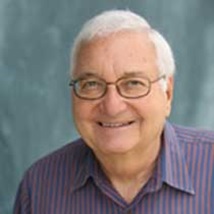
In Memoriam
Larry Stein
Professor of Pharmacology
UC Irvine
1931-2019
Larry Stein, first and foremost, was a scientist. His primary interest was the neurochemical mechanisms responsible for behavior. His forte was creating experiments to identify basic mechanisms of action for various behaviors, often with an emphasis on reward, and he had the foresight to be one of the first to publish in several important related areas.
After receiving his B.A. in 1952 from New York University he went to the University of Iowa to get his Ph.D. (1955) under the supervision of Kenneth W. Spence, one of the most prominent experimental psychologists at the time. The deep understanding of behavior he obtained served him well as he expanded his research into neuropharmacology and beyond. During his postdoctoral training at Walter Reed Army Institute of Research he used the newly discovered electrical brain self-stimulation technique to evaluate the effects of drugs on reward systems in the brain of animals. He devised a method to determine brain self-stimulation reward thresholds that is still used today to evaluate the rewarding effects of drugs. He also showed that drugs that modified brain catecholamines had differential effects on brain self-stimulation and related these effects to reward, depression and other brain dysfunctions.
In 1959 he became Head of the Department of Psychopharmacology at Wyeth Laboratories and during his 20-year stint he played a crucial role in the development of the antianxiety therapy, lorazepam (Ativan) and published extensively on the neuropharmacology of reward, punishment, learning, memory, depression and anxiety. In the late ‘70s Stein published in Nature the first behavioral reports confirming the analgesic (1976) and rewarding (1977) effects of the recently discovered enkephalins. He followed this up with numerous publications on the role of brain endorphins in reward, memory and learning.
Larry moved to UCI in 1979 and was appointed chair of the Department of Pharmacology to rejuvenate and expand the department. During his tenure he hired numerous faculty members in the areas of cardiovascular function and neuropharmacology. In the ‘80s Stein started a research project exploring cellular mechanisms of reward. This novel research showed that single brain cells could be operantly conditioned by selective application of catecholamines and certain drugs of abuse, but not other neurochemicals. Later he proposed that operant conditioning of single cells might represent the substrates of the crucial “atoms of behavior” described earlier by B.F. Skinner as necessary for operant learning.
Throughout his career Larry received a number of awards, served on numerous editorial boards, held offices in professional societies, was a scientific advisor and consultant for several drug companies, and participated on numerous university committees. He supervised numerous graduate students and he held 3 patents. Larry had a good heart, was loyal to his friends, and vigorously supported his faculty members and students. But in the end, the thing he valued most was his continuing contribution to the scientific understanding of the neurochemical basis of behavior.
James D. Belluzzi, Adjunct Professor
Pharmacology, UC Irvine
Olivier Civelli, Professor and Chair
Pharmacology, UC Irvine
After receiving his B.A. in 1952 from New York University he went to the University of Iowa to get his Ph.D. (1955) under the supervision of Kenneth W. Spence, one of the most prominent experimental psychologists at the time. The deep understanding of behavior he obtained served him well as he expanded his research into neuropharmacology and beyond. During his postdoctoral training at Walter Reed Army Institute of Research he used the newly discovered electrical brain self-stimulation technique to evaluate the effects of drugs on reward systems in the brain of animals. He devised a method to determine brain self-stimulation reward thresholds that is still used today to evaluate the rewarding effects of drugs. He also showed that drugs that modified brain catecholamines had differential effects on brain self-stimulation and related these effects to reward, depression and other brain dysfunctions.
In 1959 he became Head of the Department of Psychopharmacology at Wyeth Laboratories and during his 20-year stint he played a crucial role in the development of the antianxiety therapy, lorazepam (Ativan) and published extensively on the neuropharmacology of reward, punishment, learning, memory, depression and anxiety. In the late ‘70s Stein published in Nature the first behavioral reports confirming the analgesic (1976) and rewarding (1977) effects of the recently discovered enkephalins. He followed this up with numerous publications on the role of brain endorphins in reward, memory and learning.
Larry moved to UCI in 1979 and was appointed chair of the Department of Pharmacology to rejuvenate and expand the department. During his tenure he hired numerous faculty members in the areas of cardiovascular function and neuropharmacology. In the ‘80s Stein started a research project exploring cellular mechanisms of reward. This novel research showed that single brain cells could be operantly conditioned by selective application of catecholamines and certain drugs of abuse, but not other neurochemicals. Later he proposed that operant conditioning of single cells might represent the substrates of the crucial “atoms of behavior” described earlier by B.F. Skinner as necessary for operant learning.
Throughout his career Larry received a number of awards, served on numerous editorial boards, held offices in professional societies, was a scientific advisor and consultant for several drug companies, and participated on numerous university committees. He supervised numerous graduate students and he held 3 patents. Larry had a good heart, was loyal to his friends, and vigorously supported his faculty members and students. But in the end, the thing he valued most was his continuing contribution to the scientific understanding of the neurochemical basis of behavior.
James D. Belluzzi, Adjunct Professor
Pharmacology, UC Irvine
Olivier Civelli, Professor and Chair
Pharmacology, UC Irvine
